- Home
- Elizabeth Gaskell
The Cranford Chronicles
The Cranford Chronicles Read online
Contents
Cover
About the Author
Also by Elizabeth Gaskell
Title Page
Mr Harrison’s Confessions
Chapter I
Chapter II
Chapter III
Chapter IV
Chapter V
Chapter VI
Chapter VII
Chapter VIII
Chapter IX
Chapter X
Chapter XI
Chapter XII
Chapter XIII
Chapter XIV
Chapter XV
Chapter XVI
Chapter XVII
Chapter XVIII
Chapter XIX
Chapter XX
Chapter XXI
Chapter XXII
Chapter XXIII
Chapter XXIV
Chapter XXV
Chapter XXVI
Chapter XXVII
Chapter XXVIII
Chapter XXIX
Chapter XXX
Chapter XXXI
Cranford
Chapter I
Chapter II
Chapter III
Chapter IV
Chapter V
Chapter VI
Chapter VII
Chapter VIII
Chapter IX
Chapter X
Chapter XI
Chapter XII
Chapter XIII
Chapter XIV
Chapter XV
Chapter XVI
My Lady Ludlow
Chapter I
Chapter II
Chapter III
Chapter IV
Chapter V
Chapter VI
Chapter VII
Chapter VIII
Chapter IX
Chapter X
Chapter XI
Chapter XII
Chapter XIII
Chapter XIV
Copyright
About the Author
Elizabeth Gaskell was born on 29 September 1810 in London. She was brought up in Knutsford, Cheshire by her aunt after her mother died when she was two years old. In 1832 she married William Gaskell, who was a Unitarian minister like her father. After their marriage they lived in Manchester with their children. Elizabeth Gaskell published her first novel, Mary Barton, in 1848 to great success. She went on to publish much of her work in Charles Dickens’s magazines, Household Words and All the Year Round. Along with short stories and a biography of Charlotte Brontë, she published five more novels including North and South (1855) and Wives and Daughters (1866). Wives and Daughters is unfinished as Elizabeth Gaskell died suddenly of heart failure on 12 November 1865.
ALSO BY ELIZABETH GASKELL
Novels
Mary Barton
Ruth
Cranford
North and South
Sylvia’s Lovers
Wives and Daughters
Collected Short Stories
The Moorland Cottage
Lizzie Leigh and Other Tales
Round the Sofa
Right at Last and Other Tales
A Dark Night’s Work
Cousin Phillis and Other Tales
The Grey Woman and Other Tales
Non-Fiction
The Life of Charlotte Brontë
ELIZABETH GASKELL
The Cranford
Chronicles
Mr Harrison’s Confessions
Chapter I
THE FIRE WAS burning gaily. My wife had just gone upstairs to put baby to bed. Charles sat opposite to me, looking very brown and handsome. It was pleasant enough that we should feel sure of spending some weeks under the same roof, a thing which we had never done since we were mere boys. I felt too lazy to talk, so I ate walnuts and looked into the fire. But Charles grew restless.
‘Now that your wife is gone upstairs, Will, you must tell me what I’ve wanted to ask you ever since I saw her this morning. Tell me all about the wooing and winning. I want to have the receipt for getting such a spicy little wife of my own. Your letters only gave the barest details. So set to, man, and tell me every particular.’
‘If I tell you all, it will be a long story.’
‘Never fear. If I get tired, I can go to sleep, and dream that I am back again, a lonely bachelor, in Ceylon; and I can waken up when you have done, to know that I am under your roof. Dash away, man! “Once upon a time, a gallant young bachelor –” There’s a beginning for you!’
‘Well, then, “Once upon a time, a gallant young bachelor” was sorely puzzled where to settle, when he had completed his education as a surgeon – I must speak in the first person; I cannot go on as a gallant young bachelor. I had just finished walking the hospitals when you went to Ceylon, and, if you remember, I wanted to go abroad like you, and thought of offering myself as a ship-surgeon; but I found I should rather lose caste in my profession; so I hesitated, and while I was hesitating, I received a letter from my father’s cousin, Mr Morgan – that old gentleman who used to write such long letters of good advice to my mother, and who tipped me a five-pound note when I agreed to be bound apprentice to Mr Howard, instead of going to sea. Well, it seems the old gentleman had all along thought of taking me as his partner, if I turned out pretty well; and as he heard a good account of me from an old friend of his, who was a surgeon at Guy’s, he wrote to propose this arrangement: I was to have a third of the profits for five years; after that, half; and eventually I was to succeed to the whole. It was no bad offer for a penniless man like me, as Mr Morgan had a capital country practice, and, though I did not know him personally, I had formed a pretty good idea of him, as an honourable, kind-hearted fidgety, meddlesome old bachelor; and a very correct notion it was, as I found out in the very first half-hour of seeing him. I had had some idea that I was to live in his house, as he was a bachelor and a kind of family friend; and I think he was afraid that I should expect this arrangement, for when I walked up to his door, with the porter carrying my portmanteau, he met me on the steps, and while he held my hand and shook it, he said to the porter, “Jerry, if you’ll wait a moment, Mr Harrison will be ready to go with you to his lodgings, at Jocelyn’s, you know;” and then turning to me, he addressed his first words of welcome. I was a little inclined to think him inhospitable, but I got to understand him better afterwards. “Jocelyn’s,” said he, “is the best place I have been able to hit upon in a hurry, and there is a good deal of fever about, which made me desirous that you should come this month – a low kind of typhoid, in the oldest part of the town. I think you’ll be comfortable there for a week or two. I have taken the liberty of desiring my housekeeper to send down one or two things which give the place a little more of a home aspect – an easy-chair, a beautiful case of preparations, and one or two little matters in the way of eatables; but if you’ll take my advice, I’ve a plan in my head which we will talk about to-morrow morning. At present, I don’t like to keep you standing out on the steps here, so I’ll not detain you from your lodgings, where I rather think my housekeeper is gone to get tea ready for you.”
‘I thought I understood the old gentleman’s anxiety for his own health, which he put upon care for mine, for he had on a kind of loose grey coat, and no hat on his head. But I wondered that he did not ask me indoors, instead of keeping me on the steps. I believe, after all, I made a mistake in supposing he was afraid of taking cold; he was only afraid of being seen in dishabille. And for his apparent inhospitality, I had not been long in Duncombe before I understood the comfort of having one’s house considered as a castle into which no one might intrude, and saw good reason for the practice Mr Morgan had established of coming to his door to speak to every one. It was only the effect of habit that made him receive me so. Before long, I had the free run of his house.
‘There was every sign of kind attention and forethought on the part of some one, whom I could not doubt to be Mr Morgan, in my lodgings. I was too lazy to do much that evening, and sat in the little bow-window which projected over Jocelyn’s shop, looking up and down the street. Duncombe calls itself a town, but I should call it a village. Really, looking from Jocelyn’s, it is a very picturesque place. The houses are anything but regular; they may be mean in their details; but altogether they look well; they have not that flat unrelieved front, which many towns of far more pretensions present. Here and there a bow-window – every now and then a gable, cutting up against the sky – occasionally a projecting upper story – throws good effect of light and shadow along the street; and they have a queer fashion of their own of colouring the whitewash of some of the houses with a sort of pink blotting-paper tinge, more like the stone of which Mayence is built than anything else. It may be very bad taste, but to my mind it gives a rich warmth to the colouring. Then, here and there a dwelling-house has a court in front, with a grass-plot on each side of the flagged walk, and a large tree or two – limes or horse-chestnuts – which send their great projecting upper branches over into the street, making round dry places of shelter on the pavement in the times of summer shows.
‘While I was sitting in the bow-window, thinking of the contrast between this place and the lodgings in the heart of London, which I had left only twelve hours before – the window opens here, and, although in the centre of the town, admitting only scents from the mignonette boxes on the sill, instead of the dust and smoke of — Street – the only sound heard in this, the principal street, being the voices of mothers calling their playing children home to bed, and the eight o’clock bell of the old parish c
hurch bimbomming in remembrance of the curfew; while I was sitting thus idly, the door opened, and the little maid-servant, dropping a courtesy, said –
‘“Please, sir, Mrs Munton’s compliments, and she would be glad to know how you are after your journey.”
‘There! was not that hearty and kind? Would even the dearest chum I had at Guy’s have thought of doing such a thing? while Mrs Munton, whose name I had never heard of before, was doubtless suffering anxiety till I could relieve her mind by sending back word that I was pretty well.
‘“My compliments to Mrs Munton, and I am pretty well: much obliged to her.” It was as well to say only “pretty well,” for “very well” would have destroyed the interest Mrs Munton evidently felt in me. Good Mrs Munton! Kind Mrs Munton! Perhaps, also young – handsome – rich – widowed Mrs Munton! I rubbed my hands with delight and amusement, and, resuming my post of observation, began to wonder at which house Mrs Munton lived.
‘Again the little tap, and the little maid-servant:
‘“Please, sir, Miss Tomkinsons’ compliments, and they would be glad to know how you feel yourself after your journey.”
‘I don’t know why, but Miss Tomkinsons’ name had not such a halo about it as Mrs Munton’s. Still it was very pretty in Miss Tomkinsons to send and inquire. I only wished I did not feel so perfectly robust. I was almost ashamed that I could not send word I was quite exhausted by fatigue, and had fainted twice since my arrival. If I had but had a headache, at least! I heaved a deep breath: my chest was in perfect order; I had caught no cold; so I answered again –
‘“Much obliged to the Miss Tomkinsons; I am not much fatigued; tolerably well; my compliments.”
‘Little Sally could hardly have got downstairs, before she returned, bright and breathless:
‘“Mr and Mrs Bullock’s compliments, sir, and they hope you are pretty well after your journey.”
‘Who would have expected such kindness from such an unpromising name? Mr and Mrs Bullock were less interesting, it is true, than their predecessors; but I graciously replied –
‘“My compliments; a night’s rest will perfectly recruit me.”
‘The same message was presently brought up from one or two more unknown kind hearts. I really wished I were not so ruddy-looking. I was afraid I should disappoint the tender-hearted town when they saw what a hale young fellow I was. And I was almost ashamed of confessing to a great appetite for supper when Sally came up to inquire what I would have. Beef-steaks were so tempting; but perhaps I ought rather to have water-gruel, and go to bed. The beef-steak carried the day, however. I need not have felt such a gentle elation of spirits, as this mark of the town’s attention is paid to every one when they arrive after a journey. Many of the same people have sent to inquire after you – great, hulking, brown fellow as you are – only Sally spared you the infliction of devising interesting answers.
Chapter II
‘THE NEXT MORNING Mr Morgan came before I had finished breakfast. He was the most dapper little man I ever met. I see the affection with which people cling to the style of dress that was in vogue when they were beaux and belles, and received the most admiration. They are unwilling to believe that their youth and beauty are gone, and think that the prevailing mode is unbecoming. Mr Morgan will inveigh by the hour together against frock-coats, for instance, and whiskers. He keeps his chin close shaven, wears a black dress-coat, and dark-grey pantaloons; and in his morning round to his town patients, he invariably wears the brightest and blackest of Hessian boots, with dangling silk tassels on each side. When he goes home, about ten o’clock, to prepare for his ride to see his country patients, he puts on the most dandy top-boots I ever saw, which he gets from some wonderful boot-maker a hundred miles off. His appearance is what one calls “jemmy:” there is no other word that will do for it. He was evidently a little discomfited when he saw me in my breakfast costume, with the habits which I brought with me from the fellows at Guy’s; my feet against the fireplace, my chair balanced on its hind legs (a habit of sitting which I afterwards discovered he particularly abhorred); slippers on my feet (which, also, he considered a most ungentlemanly piece of untidiness “out of the bedroom”); in short, from what I afterwards learned, every prejudice he had was outraged by my appearance on this first visit of his. I put my book down, and sprang up to receive him. He stood, hat and cane in hand.
‘“I came to inquire if it would be convenient for you to accompany me on my morning’s round, and to be introduced to a few of our friends.” I quite detected the little tone of coldness, induced by his disappointment at my appearance, though he never imagined that it was in any way perceptible. “I will be ready directly, sir,” said I; and bolted into my bedroom, only too happy to escape his scrutinising eye.
‘When I returned, I was made aware, by sundry indescribable little coughs and hesitating noises, that my dress did not satisfy him. I stood ready, hat and gloves in hand; but still he did not offer to set off on our round. I grew very red and hot. At length he said –
‘“Excuse me, my dear young friend, but may I ask if you have no other coat besides that – ‘cut-away,’ I believe you call them? We are rather sticklers for propriety, I believe, in Duncombe; and much depends on a first impression. Let it be professional, my dear sir. Black is the garb of our profession. Forgive my speaking so plainly, but I consider myself in loco parentis.”
‘He was so kind, so bland, and, in truth, so friendly, that I felt it would be most childish to take offence; but I had a little resentment in my heart at this way of being treated. However, I mumbled, “Oh, certainly, sir, if you wish it;” and returned once more to change my coat – my poor cut-away.
‘“Those coats, sir, give a man rather too much of a sporting appearance, not quite befitting the learned professions; more as if you came down here to hunt than to be the Galen or Hippocrates of the neighbourhood.” He smiled graciously, so I smothered a sigh; for, to tell you the truth, I had rather anticipated – and, in fact, had boasted at Guy’s of the runs I hoped to have with the hounds; for Duncombe was in a famous hunting district. But all these ideas were quite dispersed when Mr Morgan led me to the inn-yard, where there was a horse-dealer on his way to a neighbouring fair, and “strongly advised me” – which in our relative circumstances was equivalent to an injunction – to purchase a little, useful, fast-trotting, brown cob, instead of a fine showy horse, “who would take any fence I put him to,” as the horse-dealer assured me. Mr Morgan was evidently pleased when I bowed to his decision, and gave up all hopes of an occasional hunt.
‘He opened out a great deal more after this purchase. He told me his plan of establishing me in a house of my own, which looked more respectable, not to say professional, than being in lodgings; and then he went on to say that he had lately lost a friend, a brother surgeon in a neighbouring town, who had left a widow with a small income, who would be very glad to live with me, and act as mistress to my establishment; thus lessening the expense.
‘“She is a lady-like woman,” said Mr Morgan, “to judge from the little I have seen of her; about forty-five or so; and may really be of some help to you in the little etiquettes of our profession; the slight delicate attentions which every man has to learn, if he wishes to get on in life. This is Mrs Munton’s, sir,” said he, stopping short at a very unromantic-looking green door, with a brass knocker.
‘I had no time to say, “Who is Mrs Munton?” before we had heard Mrs Munton was at home, and were following the tidy elderly servant up the narrow carpeted stairs into the drawing-room. Mrs Munton was the widow of a former vicar, upwards of sixty, rather deaf; but like all the deaf people I have ever seen, very fond of talking; perhaps because she then knew the subject, which passed out of her grasp when another began to speak. She was ill of a chronic complaint, which often incapacitated her from going out; and the kind people of the town were in the habit of coming to see her and sit with her, and of bringing her the newest, freshest, tidbits of news; so that her room was the centre of the gossip of Duncombe – not of scandal, mind; for I make a distinction between gossip and scandal. Now you can fancy the discrepancy between the ideal and the real Mrs Munton. Instead of any foolish notion of a beautiful blooming widow, tenderly anxious about the health of the stranger, I saw a homely, talkative, elderly person, with a keen observant eye, and marks of suffering on her face; plain in manner and dress, but still unmistakably a lady. She talked to Mr Morgan, but she looked at me; and I saw that nothing I did escaped her notice. Mr Morgan annoyed me by his anxiety to show me off; but he was kindly anxious to bring out every circumstance to my credit in Mrs Munton’s hearing, knowing well that the town-crier had not more opportunities to publish all about me than she had.

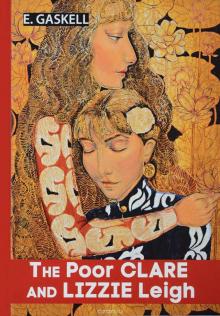 Lizzie Leigh
Lizzie Leigh The Poor Clare
The Poor Clare Lois the Witch
Lois the Witch North and South
North and South Sexton's Hero
Sexton's Hero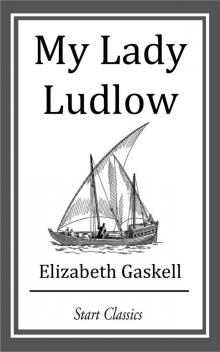 My Lady Ludlow
My Lady Ludlow Uncle Peter
Uncle Peter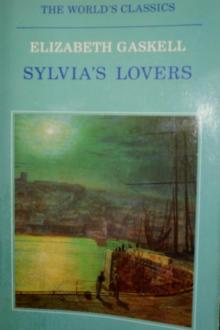 Sylvia's Lovers Elizabeth Cleghorn Gaskell
Sylvia's Lovers Elizabeth Cleghorn Gaskell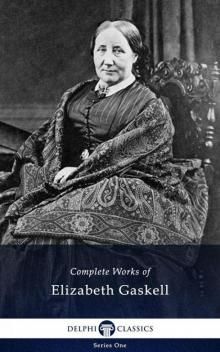 Delphi Complete Works of Elizabeth Gaskell
Delphi Complete Works of Elizabeth Gaskell The Grey Woman
The Grey Woman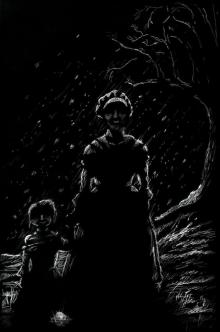 The Old Nurse's Story and Other Tales
The Old Nurse's Story and Other Tales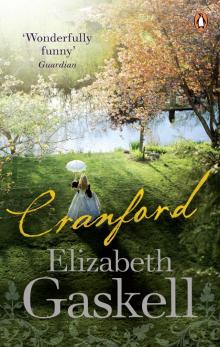 Cranford
Cranford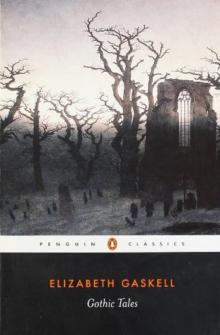 Gothic Tales
Gothic Tales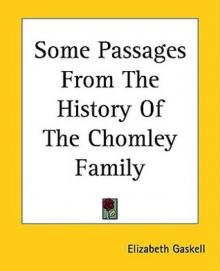 Some Passages From the History of the Chomley Family
Some Passages From the History of the Chomley Family An Accursed Race
An Accursed Race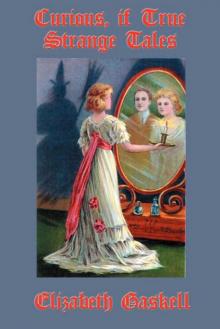 Curious, if True: Strange Tales Elizabeth Cleghorn Gaskell
Curious, if True: Strange Tales Elizabeth Cleghorn Gaskell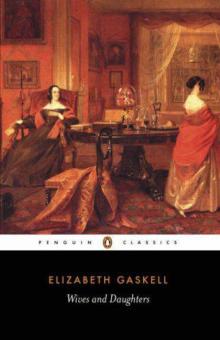 Wives and Daughters
Wives and Daughters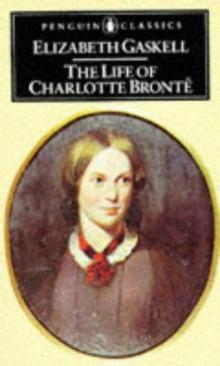 The life of Charlotte Brontë
The life of Charlotte Brontë